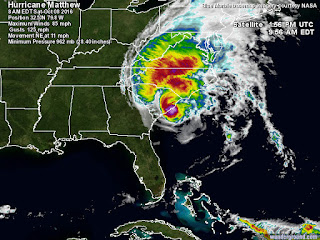What is a "Potential Tropical Cyclone"
A new weather term entered the lexicon this week when the National Hurricane Center (NHC) issued its first-ever Potential Tropical Cyclone (PTC) advisory Sunday afternoon, highlighting the threat of a strong tropical wave in the central Atlantic that is likely to affect the Windward Islands as a tropical storm. Another system in the northwest Caribbean remains on track to move into the Gulf of Mexico, where it could affect areas from Texas to Florida as a tropical storm later this week.
 |
| Hurricane Matthew |
The new Potential Tropical Cyclone advisories will provide more detailed guidance on systems that are not yet at depression strength but that have a chance of intensifying and bringing tropical storm or hurricane conditions to land areas within 48 hours. In their announcement of this and other service changes for 2017, NHC said: “Under previous longstanding NWS policy, it has not been permitted to issue a hurricane or tropical storm watch or warning until after a tropical cyclone had formed. Advances in forecasting over the past decade or so, however, now allow the confident prediction of tropical cyclone impacts while these systems are still in the developmental stage. For these land-threatening ‘potential tropical cyclones’, NHC will now issue the full suite of text, graphical, and watch/warning products that previously has only been issued for ongoing tropical cyclones.”
Potential tropical cyclones will be assigned numbers as part of the same chronological list that includes tropical depressions. Thus, the current system is PTC 2, even though it is the first PTC ever to be classified, because it follows Subtropical Depression 1 (which later became Tropical Storm Arlene).
A potential tropical cyclone will retain its PTC number should it intensify to TD strength.
Source: Weather Underground Category 6
All Hands Consulting is an emergency management consulting firm with an extensive history of supporting public and private sector clients with emergency management consulting, continuity of operations planning, and homeland security planning, training, and exercise services.


Comments
Post a Comment